Professional Development Report: Marriott International Analysis
VerifiedAdded on 2023/01/19
|7
|1697
|23
Report
AI Summary
This report delves into the realm of professional development, emphasizing its significance for career advancement and personal growth. It highlights the benefits of continuous learning, such as enhanced employability, adaptability, and improved performance, particularly within the context of the hospitality industry, using Marriott International as a case study. The report explores the expectations of employers in terms of skills and competencies, including communication, time management, and customer service, and it assesses the author's own abilities in relation to a specific job role. Additionally, it reviews various learning theories and outlines a professional development plan. The report also includes a simulated job interview scenario and evaluates the strengths and weaknesses of the interview process, ultimately providing valuable insights for individuals seeking to enhance their professional capabilities and career prospects within the service sector.
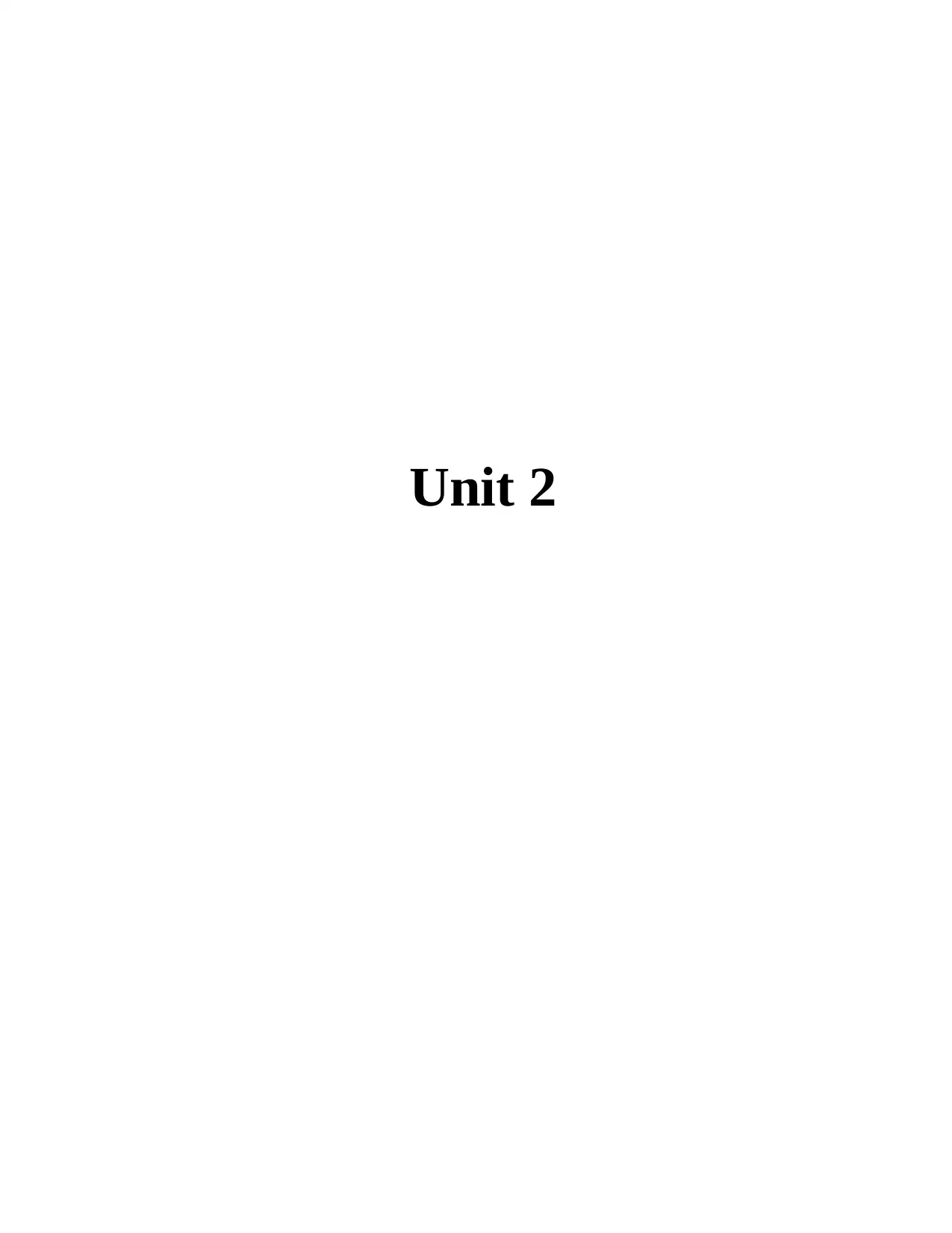
Unit 2
Paraphrase This Document
Need a fresh take? Get an instant paraphrase of this document with our AI Paraphraser
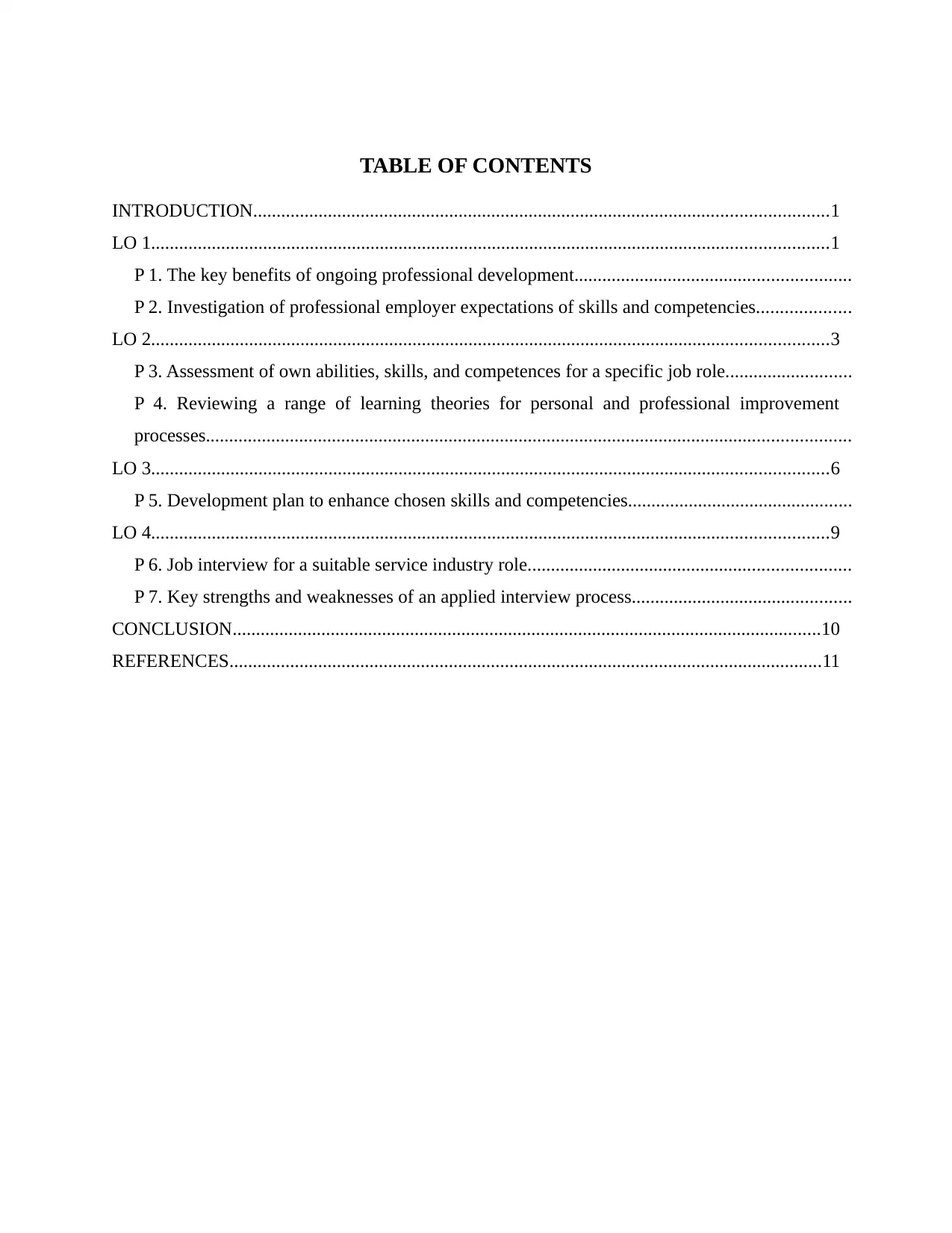
TABLE OF CONTENTS
INTRODUCTION...........................................................................................................................1
LO 1.................................................................................................................................................1
P 1. The key benefits of ongoing professional development...........................................................
P 2. Investigation of professional employer expectations of skills and competencies....................
LO 2.................................................................................................................................................3
P 3. Assessment of own abilities, skills, and competences for a specific job role...........................
P 4. Reviewing a range of learning theories for personal and professional improvement
processes..........................................................................................................................................
LO 3.................................................................................................................................................6
P 5. Development plan to enhance chosen skills and competencies................................................
LO 4.................................................................................................................................................9
P 6. Job interview for a suitable service industry role.....................................................................
P 7. Key strengths and weaknesses of an applied interview process...............................................
CONCLUSION..............................................................................................................................10
REFERENCES...............................................................................................................................11
INTRODUCTION...........................................................................................................................1
LO 1.................................................................................................................................................1
P 1. The key benefits of ongoing professional development...........................................................
P 2. Investigation of professional employer expectations of skills and competencies....................
LO 2.................................................................................................................................................3
P 3. Assessment of own abilities, skills, and competences for a specific job role...........................
P 4. Reviewing a range of learning theories for personal and professional improvement
processes..........................................................................................................................................
LO 3.................................................................................................................................................6
P 5. Development plan to enhance chosen skills and competencies................................................
LO 4.................................................................................................................................................9
P 6. Job interview for a suitable service industry role.....................................................................
P 7. Key strengths and weaknesses of an applied interview process...............................................
CONCLUSION..............................................................................................................................10
REFERENCES...............................................................................................................................11
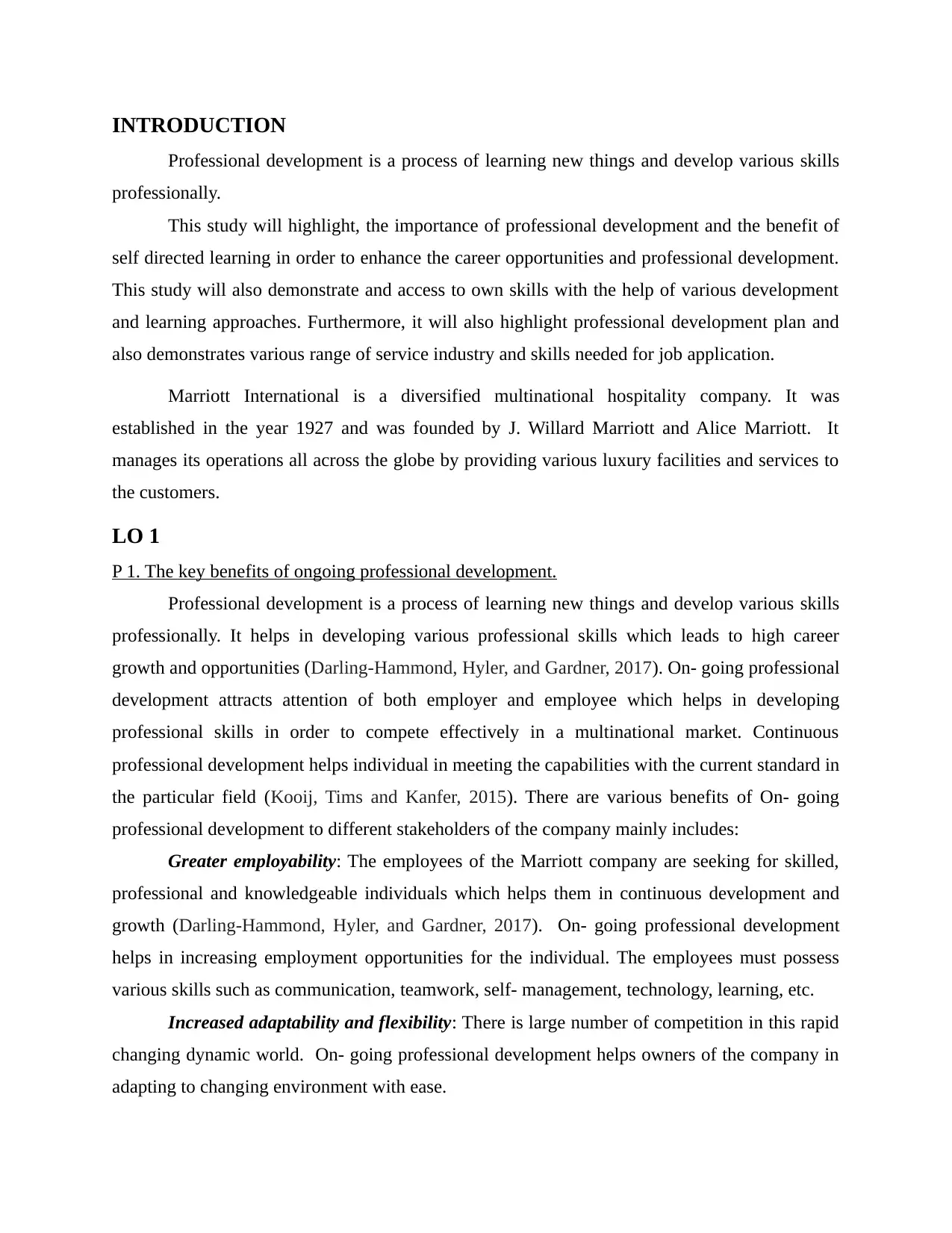
INTRODUCTION
Professional development is a process of learning new things and develop various skills
professionally.
This study will highlight, the importance of professional development and the benefit of
self directed learning in order to enhance the career opportunities and professional development.
This study will also demonstrate and access to own skills with the help of various development
and learning approaches. Furthermore, it will also highlight professional development plan and
also demonstrates various range of service industry and skills needed for job application.
Marriott International is a diversified multinational hospitality company. It was
established in the year 1927 and was founded by J. Willard Marriott and Alice Marriott. It
manages its operations all across the globe by providing various luxury facilities and services to
the customers.
LO 1
P 1. The key benefits of ongoing professional development.
Professional development is a process of learning new things and develop various skills
professionally. It helps in developing various professional skills which leads to high career
growth and opportunities (Darling-Hammond, Hyler, and Gardner, 2017). On- going professional
development attracts attention of both employer and employee which helps in developing
professional skills in order to compete effectively in a multinational market. Continuous
professional development helps individual in meeting the capabilities with the current standard in
the particular field (Kooij, Tims and Kanfer, 2015). There are various benefits of On- going
professional development to different stakeholders of the company mainly includes:
Greater employability: The employees of the Marriott company are seeking for skilled,
professional and knowledgeable individuals which helps them in continuous development and
growth (Darling-Hammond, Hyler, and Gardner, 2017). On- going professional development
helps in increasing employment opportunities for the individual. The employees must possess
various skills such as communication, teamwork, self- management, technology, learning, etc.
Increased adaptability and flexibility: There is large number of competition in this rapid
changing dynamic world. On- going professional development helps owners of the company in
adapting to changing environment with ease.
Professional development is a process of learning new things and develop various skills
professionally.
This study will highlight, the importance of professional development and the benefit of
self directed learning in order to enhance the career opportunities and professional development.
This study will also demonstrate and access to own skills with the help of various development
and learning approaches. Furthermore, it will also highlight professional development plan and
also demonstrates various range of service industry and skills needed for job application.
Marriott International is a diversified multinational hospitality company. It was
established in the year 1927 and was founded by J. Willard Marriott and Alice Marriott. It
manages its operations all across the globe by providing various luxury facilities and services to
the customers.
LO 1
P 1. The key benefits of ongoing professional development.
Professional development is a process of learning new things and develop various skills
professionally. It helps in developing various professional skills which leads to high career
growth and opportunities (Darling-Hammond, Hyler, and Gardner, 2017). On- going professional
development attracts attention of both employer and employee which helps in developing
professional skills in order to compete effectively in a multinational market. Continuous
professional development helps individual in meeting the capabilities with the current standard in
the particular field (Kooij, Tims and Kanfer, 2015). There are various benefits of On- going
professional development to different stakeholders of the company mainly includes:
Greater employability: The employees of the Marriott company are seeking for skilled,
professional and knowledgeable individuals which helps them in continuous development and
growth (Darling-Hammond, Hyler, and Gardner, 2017). On- going professional development
helps in increasing employment opportunities for the individual. The employees must possess
various skills such as communication, teamwork, self- management, technology, learning, etc.
Increased adaptability and flexibility: There is large number of competition in this rapid
changing dynamic world. On- going professional development helps owners of the company in
adapting to changing environment with ease.
⊘ This is a preview!⊘
Do you want full access?
Subscribe today to unlock all pages.

Trusted by 1+ million students worldwide
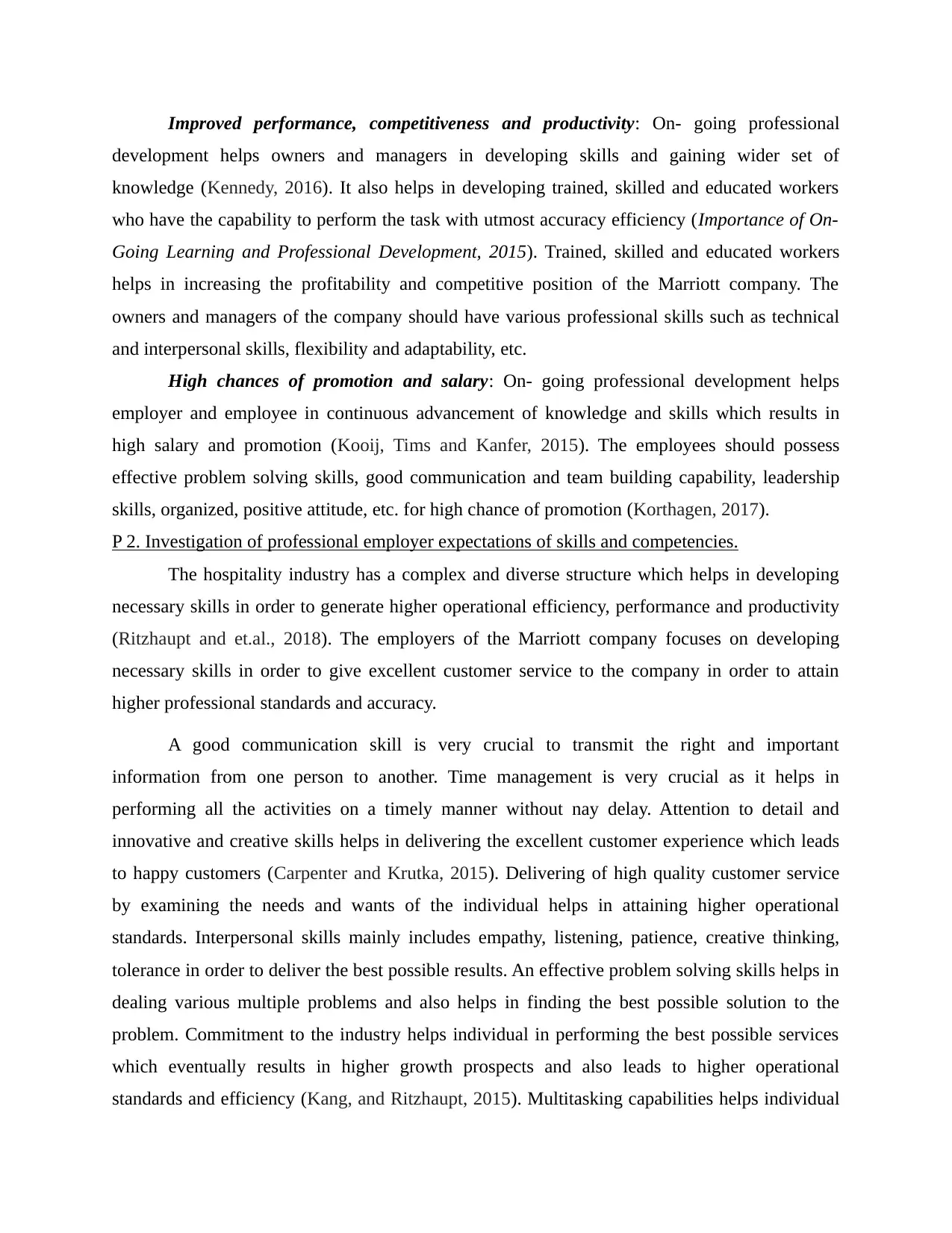
Improved performance, competitiveness and productivity: On- going professional
development helps owners and managers in developing skills and gaining wider set of
knowledge (Kennedy, 2016). It also helps in developing trained, skilled and educated workers
who have the capability to perform the task with utmost accuracy efficiency (Importance of On-
Going Learning and Professional Development, 2015). Trained, skilled and educated workers
helps in increasing the profitability and competitive position of the Marriott company. The
owners and managers of the company should have various professional skills such as technical
and interpersonal skills, flexibility and adaptability, etc.
High chances of promotion and salary: On- going professional development helps
employer and employee in continuous advancement of knowledge and skills which results in
high salary and promotion (Kooij, Tims and Kanfer, 2015). The employees should possess
effective problem solving skills, good communication and team building capability, leadership
skills, organized, positive attitude, etc. for high chance of promotion (Korthagen, 2017).
P 2. Investigation of professional employer expectations of skills and competencies.
The hospitality industry has a complex and diverse structure which helps in developing
necessary skills in order to generate higher operational efficiency, performance and productivity
(Ritzhaupt and et.al., 2018). The employers of the Marriott company focuses on developing
necessary skills in order to give excellent customer service to the company in order to attain
higher professional standards and accuracy.
A good communication skill is very crucial to transmit the right and important
information from one person to another. Time management is very crucial as it helps in
performing all the activities on a timely manner without nay delay. Attention to detail and
innovative and creative skills helps in delivering the excellent customer experience which leads
to happy customers (Carpenter and Krutka, 2015). Delivering of high quality customer service
by examining the needs and wants of the individual helps in attaining higher operational
standards. Interpersonal skills mainly includes empathy, listening, patience, creative thinking,
tolerance in order to deliver the best possible results. An effective problem solving skills helps in
dealing various multiple problems and also helps in finding the best possible solution to the
problem. Commitment to the industry helps individual in performing the best possible services
which eventually results in higher growth prospects and also leads to higher operational
standards and efficiency (Kang, and Ritzhaupt, 2015). Multitasking capabilities helps individual
development helps owners and managers in developing skills and gaining wider set of
knowledge (Kennedy, 2016). It also helps in developing trained, skilled and educated workers
who have the capability to perform the task with utmost accuracy efficiency (Importance of On-
Going Learning and Professional Development, 2015). Trained, skilled and educated workers
helps in increasing the profitability and competitive position of the Marriott company. The
owners and managers of the company should have various professional skills such as technical
and interpersonal skills, flexibility and adaptability, etc.
High chances of promotion and salary: On- going professional development helps
employer and employee in continuous advancement of knowledge and skills which results in
high salary and promotion (Kooij, Tims and Kanfer, 2015). The employees should possess
effective problem solving skills, good communication and team building capability, leadership
skills, organized, positive attitude, etc. for high chance of promotion (Korthagen, 2017).
P 2. Investigation of professional employer expectations of skills and competencies.
The hospitality industry has a complex and diverse structure which helps in developing
necessary skills in order to generate higher operational efficiency, performance and productivity
(Ritzhaupt and et.al., 2018). The employers of the Marriott company focuses on developing
necessary skills in order to give excellent customer service to the company in order to attain
higher professional standards and accuracy.
A good communication skill is very crucial to transmit the right and important
information from one person to another. Time management is very crucial as it helps in
performing all the activities on a timely manner without nay delay. Attention to detail and
innovative and creative skills helps in delivering the excellent customer experience which leads
to happy customers (Carpenter and Krutka, 2015). Delivering of high quality customer service
by examining the needs and wants of the individual helps in attaining higher operational
standards. Interpersonal skills mainly includes empathy, listening, patience, creative thinking,
tolerance in order to deliver the best possible results. An effective problem solving skills helps in
dealing various multiple problems and also helps in finding the best possible solution to the
problem. Commitment to the industry helps individual in performing the best possible services
which eventually results in higher growth prospects and also leads to higher operational
standards and efficiency (Kang, and Ritzhaupt, 2015). Multitasking capabilities helps individual
Paraphrase This Document
Need a fresh take? Get an instant paraphrase of this document with our AI Paraphraser
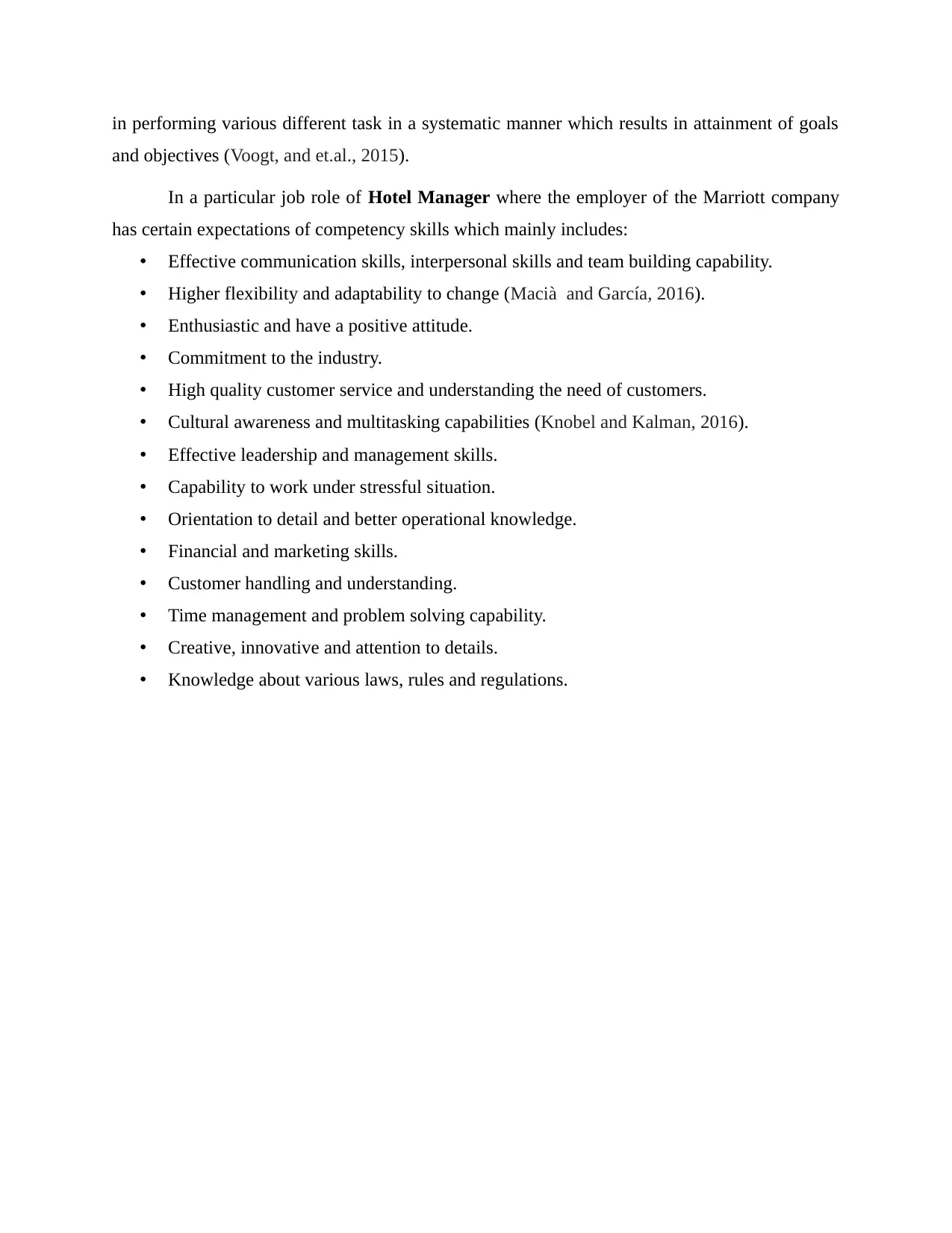
in performing various different task in a systematic manner which results in attainment of goals
and objectives (Voogt, and et.al., 2015).
In a particular job role of Hotel Manager where the employer of the Marriott company
has certain expectations of competency skills which mainly includes:
• Effective communication skills, interpersonal skills and team building capability.
• Higher flexibility and adaptability to change (Macià and García, 2016).
• Enthusiastic and have a positive attitude.
• Commitment to the industry.
• High quality customer service and understanding the need of customers.
• Cultural awareness and multitasking capabilities (Knobel and Kalman, 2016).
• Effective leadership and management skills.
• Capability to work under stressful situation.
• Orientation to detail and better operational knowledge.
• Financial and marketing skills.
• Customer handling and understanding.
• Time management and problem solving capability.
• Creative, innovative and attention to details.
• Knowledge about various laws, rules and regulations.
and objectives (Voogt, and et.al., 2015).
In a particular job role of Hotel Manager where the employer of the Marriott company
has certain expectations of competency skills which mainly includes:
• Effective communication skills, interpersonal skills and team building capability.
• Higher flexibility and adaptability to change (Macià and García, 2016).
• Enthusiastic and have a positive attitude.
• Commitment to the industry.
• High quality customer service and understanding the need of customers.
• Cultural awareness and multitasking capabilities (Knobel and Kalman, 2016).
• Effective leadership and management skills.
• Capability to work under stressful situation.
• Orientation to detail and better operational knowledge.
• Financial and marketing skills.
• Customer handling and understanding.
• Time management and problem solving capability.
• Creative, innovative and attention to details.
• Knowledge about various laws, rules and regulations.
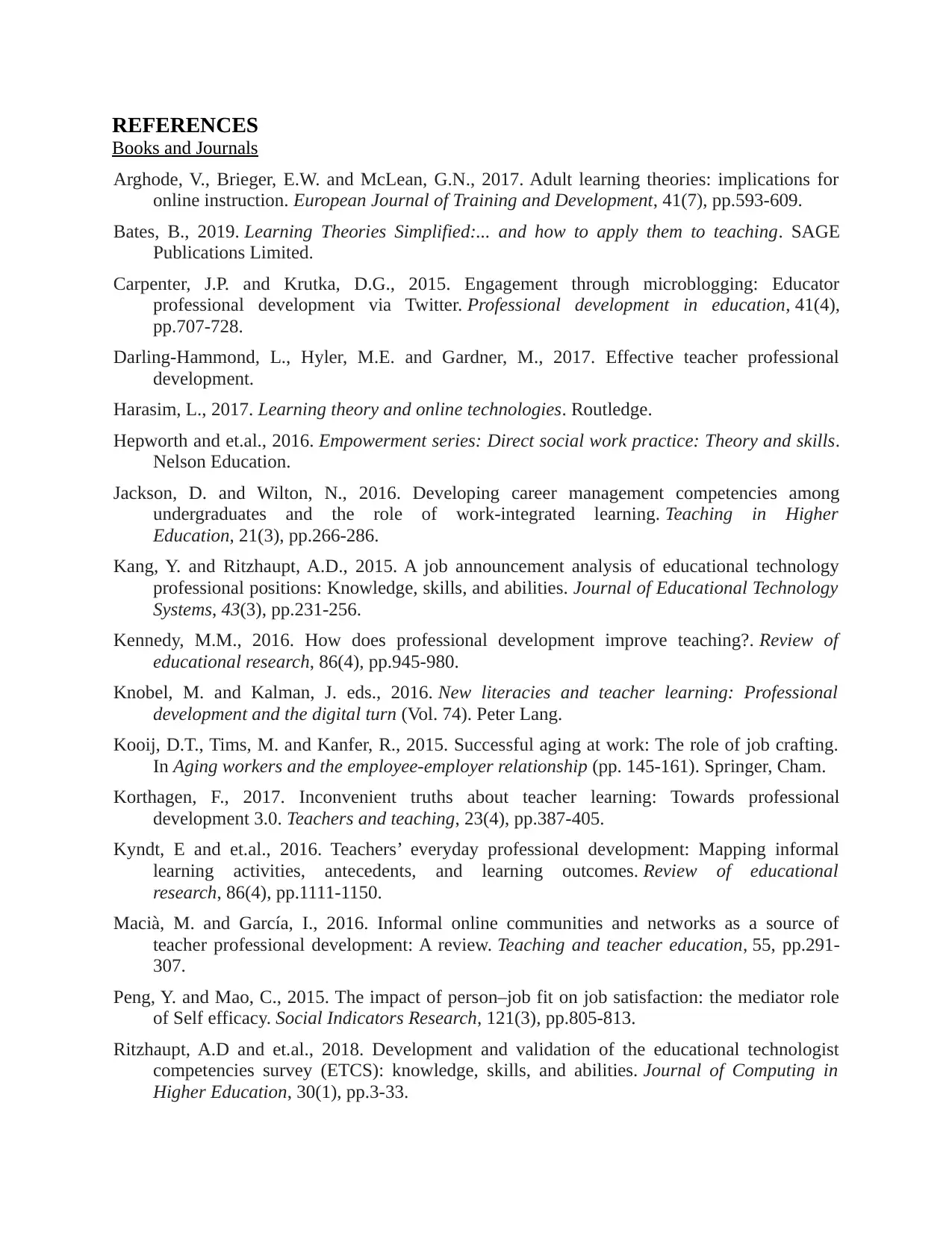
REFERENCES
Books and Journals
Arghode, V., Brieger, E.W. and McLean, G.N., 2017. Adult learning theories: implications for
online instruction. European Journal of Training and Development, 41(7), pp.593-609.
Bates, B., 2019. Learning Theories Simplified:... and how to apply them to teaching. SAGE
Publications Limited.
Carpenter, J.P. and Krutka, D.G., 2015. Engagement through microblogging: Educator
professional development via Twitter. Professional development in education, 41(4),
pp.707-728.
Darling-Hammond, L., Hyler, M.E. and Gardner, M., 2017. Effective teacher professional
development.
Harasim, L., 2017. Learning theory and online technologies. Routledge.
Hepworth and et.al., 2016. Empowerment series: Direct social work practice: Theory and skills.
Nelson Education.
Jackson, D. and Wilton, N., 2016. Developing career management competencies among
undergraduates and the role of work-integrated learning. Teaching in Higher
Education, 21(3), pp.266-286.
Kang, Y. and Ritzhaupt, A.D., 2015. A job announcement analysis of educational technology
professional positions: Knowledge, skills, and abilities. Journal of Educational Technology
Systems, 43(3), pp.231-256.
Kennedy, M.M., 2016. How does professional development improve teaching?. Review of
educational research, 86(4), pp.945-980.
Knobel, M. and Kalman, J. eds., 2016. New literacies and teacher learning: Professional
development and the digital turn (Vol. 74). Peter Lang.
Kooij, D.T., Tims, M. and Kanfer, R., 2015. Successful aging at work: The role of job crafting.
In Aging workers and the employee-employer relationship (pp. 145-161). Springer, Cham.
Korthagen, F., 2017. Inconvenient truths about teacher learning: Towards professional
development 3.0. Teachers and teaching, 23(4), pp.387-405.
Kyndt, E and et.al., 2016. Teachers’ everyday professional development: Mapping informal
learning activities, antecedents, and learning outcomes. Review of educational
research, 86(4), pp.1111-1150.
Macià, M. and García, I., 2016. Informal online communities and networks as a source of
teacher professional development: A review. Teaching and teacher education, 55, pp.291-
307.
Peng, Y. and Mao, C., 2015. The impact of person–job fit on job satisfaction: the mediator role
of Self efficacy. Social Indicators Research, 121(3), pp.805-813.
Ritzhaupt, A.D and et.al., 2018. Development and validation of the educational technologist
competencies survey (ETCS): knowledge, skills, and abilities. Journal of Computing in
Higher Education, 30(1), pp.3-33.
Books and Journals
Arghode, V., Brieger, E.W. and McLean, G.N., 2017. Adult learning theories: implications for
online instruction. European Journal of Training and Development, 41(7), pp.593-609.
Bates, B., 2019. Learning Theories Simplified:... and how to apply them to teaching. SAGE
Publications Limited.
Carpenter, J.P. and Krutka, D.G., 2015. Engagement through microblogging: Educator
professional development via Twitter. Professional development in education, 41(4),
pp.707-728.
Darling-Hammond, L., Hyler, M.E. and Gardner, M., 2017. Effective teacher professional
development.
Harasim, L., 2017. Learning theory and online technologies. Routledge.
Hepworth and et.al., 2016. Empowerment series: Direct social work practice: Theory and skills.
Nelson Education.
Jackson, D. and Wilton, N., 2016. Developing career management competencies among
undergraduates and the role of work-integrated learning. Teaching in Higher
Education, 21(3), pp.266-286.
Kang, Y. and Ritzhaupt, A.D., 2015. A job announcement analysis of educational technology
professional positions: Knowledge, skills, and abilities. Journal of Educational Technology
Systems, 43(3), pp.231-256.
Kennedy, M.M., 2016. How does professional development improve teaching?. Review of
educational research, 86(4), pp.945-980.
Knobel, M. and Kalman, J. eds., 2016. New literacies and teacher learning: Professional
development and the digital turn (Vol. 74). Peter Lang.
Kooij, D.T., Tims, M. and Kanfer, R., 2015. Successful aging at work: The role of job crafting.
In Aging workers and the employee-employer relationship (pp. 145-161). Springer, Cham.
Korthagen, F., 2017. Inconvenient truths about teacher learning: Towards professional
development 3.0. Teachers and teaching, 23(4), pp.387-405.
Kyndt, E and et.al., 2016. Teachers’ everyday professional development: Mapping informal
learning activities, antecedents, and learning outcomes. Review of educational
research, 86(4), pp.1111-1150.
Macià, M. and García, I., 2016. Informal online communities and networks as a source of
teacher professional development: A review. Teaching and teacher education, 55, pp.291-
307.
Peng, Y. and Mao, C., 2015. The impact of person–job fit on job satisfaction: the mediator role
of Self efficacy. Social Indicators Research, 121(3), pp.805-813.
Ritzhaupt, A.D and et.al., 2018. Development and validation of the educational technologist
competencies survey (ETCS): knowledge, skills, and abilities. Journal of Computing in
Higher Education, 30(1), pp.3-33.
⊘ This is a preview!⊘
Do you want full access?
Subscribe today to unlock all pages.

Trusted by 1+ million students worldwide
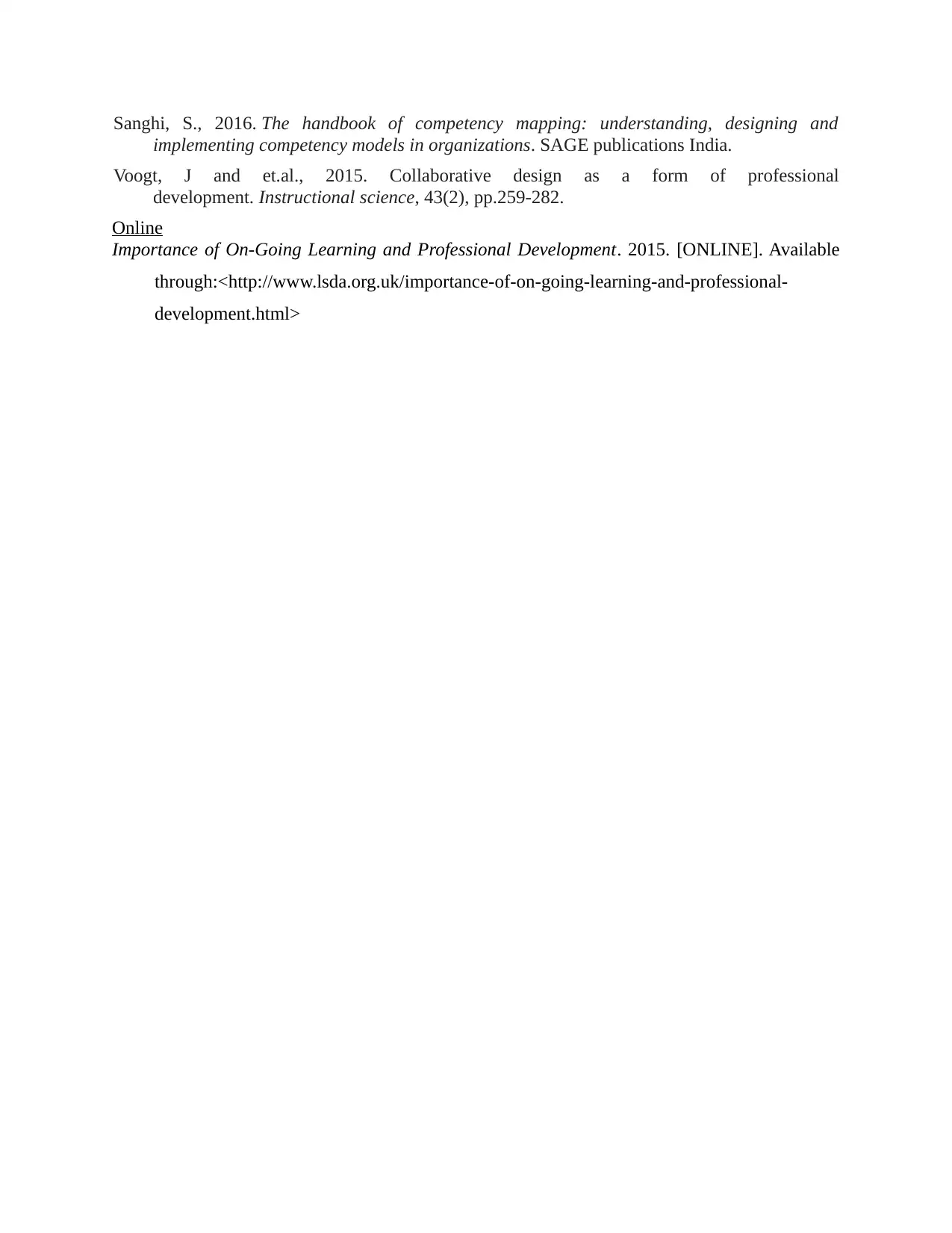
Sanghi, S., 2016. The handbook of competency mapping: understanding, designing and
implementing competency models in organizations. SAGE publications India.
Voogt, J and et.al., 2015. Collaborative design as a form of professional
development. Instructional science, 43(2), pp.259-282.
Online
Importance of On-Going Learning and Professional Development. 2015. [ONLINE]. Available
through:<http://www.lsda.org.uk/importance-of-on-going-learning-and-professional-
development.html>
implementing competency models in organizations. SAGE publications India.
Voogt, J and et.al., 2015. Collaborative design as a form of professional
development. Instructional science, 43(2), pp.259-282.
Online
Importance of On-Going Learning and Professional Development. 2015. [ONLINE]. Available
through:<http://www.lsda.org.uk/importance-of-on-going-learning-and-professional-
development.html>
1 out of 7
Related Documents
Your All-in-One AI-Powered Toolkit for Academic Success.
+13062052269
info@desklib.com
Available 24*7 on WhatsApp / Email
![[object Object]](/_next/static/media/star-bottom.7253800d.svg)
Unlock your academic potential
Copyright © 2020–2026 A2Z Services. All Rights Reserved. Developed and managed by ZUCOL.





